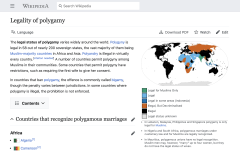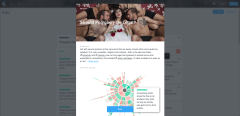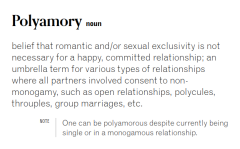
Aparently, this question is getting asked more and more often nowadays, so let me put in my two cents worth. Are polyamorists part of LGBTQ+? And I don't mean those who, like myself, are both pansexual and poly, or both trans and poly, because of course we are. I mean: does polyamory itself make you part of the community?
Is it in the name?
Let me start by saying that I'm not the biggest fan of the acronym “LGBTQ+”. As much is it makes it easy to explain to allocishets what's the deal, I'm not a fan, because it's very specific in terms of listing its members. Which leaves it open for endless fights about who's in and who's out.
Which letters did we forget to include? Isn't that too many letters to remember and pronounce? Should we maybe get rid of the T “bEcAuSe ItS nOt An OrIeNtAtIoN”? Does “A” stand for asexual, aromantic, agender, or maybe even ally? What's hiding under the plus? All those fights are so counterproductive… 🙄
Even though I don't use it too often (as hardly anyone knows this acronym), I really prefer for instance GSRM.
It stands for “Gender, Sexual, and Romantic Minorities”. It includes everyone that is minoritised because of those reasons. That's it. Doesn't matter if you're discriminated because of your own gender, or the gender of people you love or sleep with, or the way you show that affection… You're in. This acronym doesn't list groups that can join. It describes the type of issues that bring us together.
Another word I like and use in lieu of LGBTQ+ – despite its history as a reclaimed slur – is “queer”. It also describes us in a simple way: we're the “strange ones”, the ones that don't fit in in the patriarchal, cishetnormative society and its rules.
And obviously, polyamorists fit both of those. We're a romantic & sexual minority. We're different, we're strange, we're queer.
Honestly, looking at so many cishetnormative relationships around me, I feel like desiring relationships that are based on honesty and love instead of just exclusivity and outdated gender norms, is the queerest thing imaginable.
Are we facing similar discrimination?
That's a simple one: yes.
The main issue that LGBTQ+ activists are fighting for all around the world is the right to marry whichever consenting adult we want. Sure, the main focus is on the gender of the partners, but why wouldn't the same ideal apply to the number of partners?
If I'm in a loving, committed relationship, but can't possibly get married to that person if we wanted to, just because we both have the same type of genitals – that's a blatant discrimination, right?
And if I'm in a loving, committed relationship, but can't possibly get married to that person if we wanted to, just because… I'm also in another loving, committed relationship? How is that not discrimination, huh?
And no, the countries listed on wiki as recognising polygamous marriages, aren't what I have in mind. It's a totally different approach to marriage: religious, based on a misogynystic culture of treating women as submissive. Not a single polyamorous person I know would feel liberated if they emigrated to one of those countries.
Apart from the lack of legal recognition, polyamorous people are also facing adversity elsewhere. Because it's not normal in our societies, isn it? We look like cheaters, don't we? We're some sort of sex freaks, right?
We're far from being mainstream. We're misunderstood, slut-shamed, kink-shamed… We don't get much representation in movies, series or books… Our coming outs as polyamorous are not that different from gay people's coming outs as gay. The world is just as couple-normative, as it is heteronormative, cisnormative and allonormative.
But is it an identity?
We tend to think of polyamory in terms of “having multiple partners at the moment”, don't we? Can a single person be poly? Can a person in a monogamous relationship be poly?
Doesn't that remind you of what bi people go through? “Oh this bi girl is dating a guy now, so I guess she chose to be straight”… Yeah, no.
My definition of polyamory puts the spotlight not on the current situation, but on the desire not to be limited to one person, on the approach to relationships that's based on honesty and openness – and not exclusivity. Just like a gay virgin is still gay. Just like a trans person before transition is still trans. Just like a bisexual man in a relationship with a guy doesn't suddenly become gay.
Polyamory is not temporary. It's not a fluke. It's not a nuisance.
It's who we are.
Summing up.
The best thing about the LGBTQ+ community is its inclusivity. So it's time to show it. We see a group of people whose romantic and sexual identity makes them marginalised, who undergo struggles similar in so many ways to what other queers experience. It's time to welcome them with open arms.




